 Leading Blog | Posts by Month |
 Leading Blog | Posts by Month |
04.30.13

LeadershipNow 140: April 2013 Compilation
See more on
Posted by Michael McKinney at 03:47 PM
04.29.13

Are You a Giver or a Taker?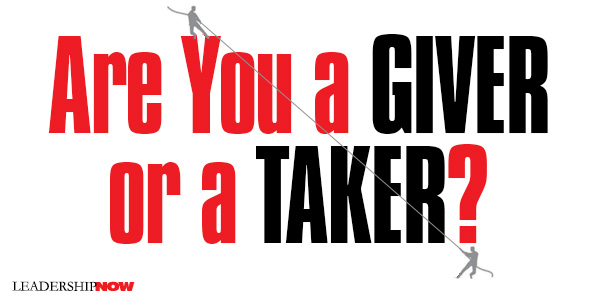
RESEARCH shows that givers sink to the bottom of the success ladder. Givers may make others better off, but they do so at their own expense. But here's the thing, givers also land at the top of the ladder with takers and matchers in the middle. Adam Grant explores in Give and Take, what separates givers at the bottom and top. And the difference is not competence, but the kinds of strategies givers use and the choices they make.Grant notes that in "purely zero-sum situations and win-lose interactions, giving rarely pays off…. But most of life isn't zero-sum." The giver advantage is often hard to see in the short term because the "giver advantage grows over time." Chip Conley, founder of Joie de Vivre Hotels, explains, "Being a giver is not good for a 100-yard dash, but it's valuable in a marathon." The Strength of Weak Ties Givers connect with the people they know casually--their acquaintances. Although it is harder to ask them for help, they are the faster route to new leads and ideas. "The dormant ties provided more novel information than the current contacts. Over the past few years, while they were out of touch, they had been exposed to new ideas and perspectives." The Five-Minute Favor: "You should be willing to do something that will take you five minutes or less for anybody." Givers create a ripple effect around themselves. "Giving, especially when it's distinctive and consistent, establishes a pattern that shifts other people's reciprocity styles within a group." Givers take on the tasks that are in the best interests of the group. Developing Others As leaders, givers don't look for talent first, they focus on motivation. "Because they tend to be trusting and optimistic about other people's intentions, in their roles as leaders, managers, and mentors, givers are inclined to see the potential in everyone." Takers have a general distrust of others. "Even when takers are impressed by another person's capabilities or motivation, they're more likely to see this person as a threat, which means they're less willing to support and develop him or her." Takers desire to be the smartest person in the room. "The matcher's mistake lies in waiting for signs of high potential. Since matchers tend to play it safe, they often wait to offer support until they've seen evidence of promise." Otherish Givers Givers that end up on top are otherish. "Being otherish means being willing to give more than you receive, but still keeping your own interests in sight, using them as a guide for choosing when, where, how, and to whom you give." Giving energizes and is meaningful when it is done out of choice rather than duty or obligation—and otherish givers give more than totally selfless givers. To avoid being taken, it is important to distinguish between givers and takers and those that pretend to be givers. Givers become matchers when they are dealing with takers. Grant provides a lot of fresh examples—people from all walks of life. What he finds most magnetic about successful givers: "they get to the top without cutting others down, finding ways of expanding the pie that benefits themselves and the people around them. Whereas success is zero-sum in a group of takers, in groups of givers, it may be true that the whole is greater than the sum of the parts."

Posted by Michael McKinney at 09:10 PM
04.26.13

Learning the Wrong Lesson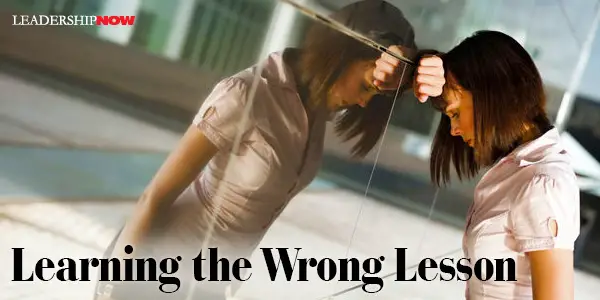
INJUSTICES HAPPEN. Bad things happen to good people. And when they do, we need to be sure we are taking away the right lesson. When something bad happens we naturally prefer to process the injustice in a way that makes us come out as the victim; we are right, they are wrong. Sympathy is in our corner. But, if we are honest with ourselves, rarely do we find ourselves in a situation where we played no part. And if we have the courage to step back, we can see where we contributed to the perceived injustice. In What You're Really Meant to Do, Robert Kaplan tells the story of a television producer that got passed over for a promotion. Initially, he took the easy way out. He chose to frame it as a "political" issue. "The people who get the jobs are the ones with the connections. All this talk about being a team player and helping others sounds nice, but it's not how people get ahead." This is the wrong lesson. Worse still is the fact that this thinking taints all of your thinking and behavior from this point forward and contributes to further "injustices" down the road. You undermine your "ability to exhibit character and leadership traits" that could help your career, says Kaplan. With this narrative in your head, you fail to do the things you should and when things don't go well for you, you create a self-fulfilling prophecy that further degrades your attitude and performance. At that point, everything you do is operating from a place of weakness and not your strengths. He adds, the producer "found it easier to stew about the unfairness of it rather than take the more uncomfortable path of figuring out how he needed to improve." We all typically do this but we can't leave it there. Kaplan wisely counsels: I urge people who have suffered a trauma that they experience as an injustice to take time out to process it. You need to reflect on what just happened, seek advice from others who witnessed it, and figure out whether you played a role in what happened…. Learning the wrong lesson, or failing to learn at all, may doom you to repeat some version of the same experience. When you have been wronged, slow down long enough to learn the right lesson. 
Posted by Michael McKinney at 01:19 PM
04.18.13

Reinventing You – Becoming the Person You Were Meant to Be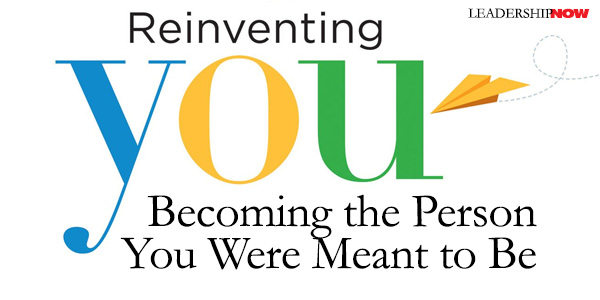
IT’S not uncommon to think of personal reinvention as being somewhat contrived or manipulative. But reinventing you isn’t about becoming what you are not, but more of who you are. In Reinventing You, Dorie Clark says “it’s about taking control of your life and living strategically. Who do you want to be? And what do you need to get there?” It’s about making sure that our personal brands reflect the reality of our lives (Facebook notwithstanding). KNOW YOURSELF Clark takes you through the whole process, beginning with, of course, starting where you are. This is a vital step and not to be glossed over because many of us don’t know where we are starting. We need you to understand our reputation and why it is what it is. She offers ways to do this, questions to ask, and how to conduct your own 360 interview—determining what those around you think about you. Very valuable material. Next you need to research your next move or future destination and test drive it. (Did you know that there is a company that allows you to test-drive over 125 new careers to see if they are a fit?) Once you have determined where you need to be, it is important to develop the skills you need. Clark explains how to do this and when to go back to school and when not to, and finding a mentor (someone who embodies what you’d like to develop and the person you’d like to become). LEVERAGE YOUR POINTS OF DIFFERENCE Rebranding yourself publicly means understanding first, what is unique about you. It may not be what you think. Often it's the mindsets and thinking that proved valuable in your current situation may differentiate you in a completely unrelated field. The examples of people that Clark provides, who have done just that, are very helpful in getting you to see your unique contribution. From that you can build your narrative that pulls together the underlying themes that connect your professional experiences in a way that is obvious to others. THE GAP There is a time lag–a gap–between fully inhabiting the “old you” and the “new you.” Clark writes that the “hardest part of making a transition can be bridging the gap between how others used to perceive you (and how you perceive yourself) and how you’d like to be seen moving forward.” She says the only solution is to fake it till you make it. I’m sure that we have all experienced this dynamic when making any personal change. When no one readily accepts the nice person you have finally become, it’s easy to give it up and resort to the old habits of behavior. The answer is to keep projecting the new behavior until you’re comfortable with it and others begin to accept it as the new “normal.” Your commitment to the new you will eventually win people over. Clark adds, “You need to be hyperaware of what you’re doing and make sure you’re signaling explicitly to the outside world what you’re trying to build.” This is where doing the homework in step one—know yourself—will help you to have the fortitude to press on. Clark explains how to get the word out and how to prove your worth. She reminds us that rebranding is a process and not a one-time activity. It is important to “keep monitoring your reputation to ensure you’re being perceived by others the way you’d like.” This is a well done and thoughtful book that is valuable not just for rebranding yourself but also for managing your reputation in general.

Posted by Michael McKinney at 04:28 PM
04.15.13

Nice Companies Finish First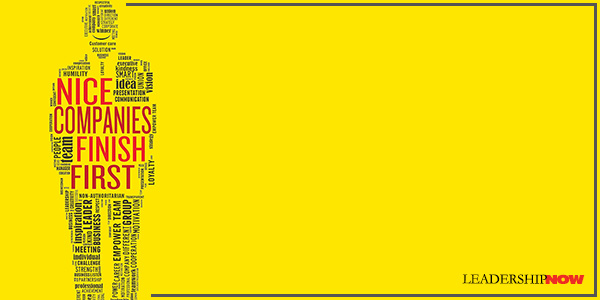
WHEN you have the power usually associated with leadership, it's easy to begin thinking that you can do anything you want. You can treat people any way you want. Sometimes it works in the short term, but it never works in the long term. It's self-centered, and it eventually kills your influence. It's the core message of Nice Companies Finish First by Peter Shankman: "Being a selfish bastard who doesn't believe the rules apply to you simply won't get you very far." Shankman cites a study where 700 people from a variety of industries reported on the treatment they received from their managers: 31% reported that their supervisor gave them the "silent treatment" during the year.
And it goes on. Not surprisingly, this kind of abusive behavior results in a workforce that "experienced more exhaustion, job tension, nervousness, depressed mood, and mistrust." Shankman says your manager might be a jerk if they: are a know-it-all dictator, are uninterested in feedback, take sides unfairly and openly, are wasteful of resources, are a Desert Island boss (non-existent), a builder of empires, are a talker and not a doer, think adversaries work better than teams or are in a constant cycle of crisis. The Nine "Nice" Characteristics Shankman then identifies nine "nice" characteristics that will eradicate "jerk" behavior beginning with "enlightened self-interest" since it underpins all of the others. A leader with enlightened self-interest will think in terms of the transactional benefits of everything they do. To be sure, there are times when a leader must make unpopular decisions, but, says Shankman, "you can make beneficial decisions and lead your company to greatness without resorting to third-grade schoolyard tactics." An enlightened leader is accountable, invests in others, consults with those affected by decisions, seeks counsel, expects the truth, and reacts mindfully and positively to any situation. The other traits he describes are: Accessibility (Inaccessible, aloof CEOs can run successful businesses for a while, but in the long run, they make bad leaders.), Strategic Listening (leadership is "a lot less about convincing people and more about benefiting from complex information and getting the best out of the people you work with. Listening for comprehension helps get you that information, of course, but it's more than that; it's also the greatest sign of respect you can give someone."), Good Stewardship (Good stewardship is about responsible management and ethical standards that are in sync with the concerns of all of the constituents who are important to your business, including shareholders, stakeholders, investors, neighbors, and communities.), Loyalty (360 Loyalty–loyal to what works for the whole company and for all good employees.), Glass-Half Full POV (Seeing the difference between "Everything's OK!" and "Everything will be OK if we do the following things."), Customer Service-Centric ("Makes it easy for people to become and stay customers in every way possible." Serving first selling second.), Merit-Based Competitor (Compete by differentiation. It's OK to be nice to your competition. Kill them with kindness.), and Gives a Damn ("Turning down the easy buck to instead do the right thing is one of the hardest choices we have to make."). You can't fake being nice. "As communication becomes more fluid, leaders will be more exposed. We won't be able to hide anything anymore."

Posted by Michael McKinney at 12:14 AM
04.08.13

Former British Prime Minister Margaret Thatcher Dies Today at 87
FORMER British Prime Minister Margaret Thatcher, the first and the only woman to become British prime minister, died today at the age of 87 from a stroke. Thatcher served from 1975 to 1990 as leader of the Conservative Party. She was called the "Iron Lady" for her personal and political toughness. Thatcher was proud of her modest background and was known as a grocer's daughter. She studied chemistry at Oxford and may have even helped invent soft-serve ice cream where she worked as a research chemist after graduation. She was involved in politics from a young age, giving her first political speech at 20. David Cameron, the Prime Minister, said: “We've lost a great prime minister, a great leader, a great Briton. She didn't just lead our country, she saved our country, and I believe she'll go down as the greatest British peacetime prime minister.”  On Power
On Convictions
“Consensus: The process of abandoning all beliefs, principles, values, and policies in search of something in which no one believes, but to which no one objects; the process of avoiding the very issues that have to be solved, merely because you cannot get agreement on the way ahead. What great cause would have been fought and won under the banner: ‘I stand for consensus?” "If you just set out to be liked, you would be prepared to compromise on anything at any time and you would achieve nothing." On Society
“It used to be about trying to do something. Now it's about trying to be someone.” “Do you know that one of the great problems of our age is that we are governed by people who care more about feelings than they do about thoughts and ideas.” On Character
On Work Ethic
“I do not know anyone who has gotten to the top without hard work. That is the recipe. It will not always get you to the top, but it will get you pretty near.” On Perseverance
On Patience
On Leadership
Posted by Michael McKinney at 10:52 PM
04.03.13

4 Reasons We Struggle with Ethics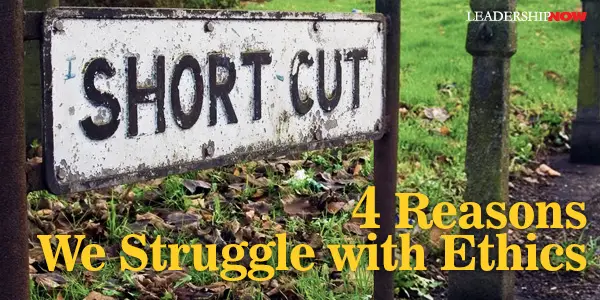
ETHICS IS ABOUT who we are. Ethics is not so much about what is happening around us, it’s much more about what is going on inside of us. Understanding the difference is critical to being a person with good ethics. Ethics are not concerned about what we can do, but what we should do. Ethics align us to our purpose and our values no matter what is happening around us. Ethics are about how we will measure our life. Our choices are taking us somewhere. The question is, “Where do we want to end up and what kind of person do we want to be when we get there?” Our ethics can be compromised for the following reasons: We want to win. The pressure to deliver results now causes us to make decisions to get us what we want now but ones that will eventually take us to the wrong place. Compromises are everywhere. We are one decision away from compromise. Ethics come in to play when the right decision for the long term doesn’t make sense for the short-term. Actions based on long-term values may not give us the same sense of achievement as short-term based actions, but they take us to two different places. If the right decision means losing in the short-term, the question then becomes, “How important is winning?” We think our situation is different. We’re the exception. But if what is right is dependent on our situation, then nothing is right. To be right, right must be applicable to all people across all situations. Sometimes we think we can avoid the consequences if our intentions are good. But the reality is we can’t avoid the consequences. Every choice has a consequence. We look for shortcuts. Shortcuts are duplicitous. They involve compromise and they cost us far more than they save us. Shortcuts are often doing the right thing at the wrong time. It’s the easy route. A shortcut is simply finding the path of least resistance. Shortcuts are simply a way to avoid the price of admission. Good things take time. We just get tired of waiting. When we look back on the decisions we have made in our life where in an effort to hurry things along, we can see where we compromised our character—our ethics. Looking back we can see that we paid a higher price than if we had stayed the course. If getting there quicker—the what—is more important than how we get there, then we will compromise our ethics. We think ethics is about rules. Laws can be demanded of people but ethics can’t. Rules are reactive. Ethics is proactive. Rules are about maintaining. Ethics is about leadership. Rules can only go so far. You can’t lead on rules alone. Rules can only regulate certain behaviors, but to grow you need to lead with ethics. Leading with ethics means to lead within a framework defined by how not what. Ethics provide a framework in which to make right choices—a framework in which to lead. They provide the how for our what. Of Related Interest:
Posted by Michael McKinney at 11:06 PM
04.01.13

First Look: Leadership Books for March 2013Here's a look at some of the best leadership books to be released in March.




For bulk orders call 1-800-423-8273  Build your leadership library with these specials on over 120 titles. All titles are at least 40% off the list price and are available only in limited quantities.
Posted by Michael McKinney at 07:09 AM
|
BUILD YOUR KNOWLEDGE


How to Do Your Start-Up Right STRAIGHT TALK FOR START-UPS 
Grow Your Leadership Skills NEW AND UPCOMING LEADERSHIP BOOKS 
Leadership Minute BITE-SIZE CONCEPTS YOU CAN CHEW ON 
Classic Leadership Books BOOKS TO READ BEFORE YOU LEAD |
|